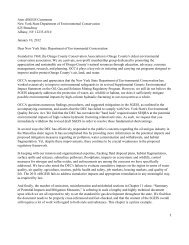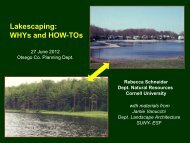Oil and Gas at Your Door? (2005 Edition) - Earthworks
Oil and Gas at Your Door? (2005 Edition) - Earthworks
Oil and Gas at Your Door? (2005 Edition) - Earthworks
Create successful ePaper yourself
Turn your PDF publications into a flip-book with our unique Google optimized e-Paper software.
First, why we did not sign a surface agreement.<br />
We had been very public about the emerging problems from the time we learned of the activity<br />
in our county. We <strong>at</strong>tended meetings of angry l<strong>and</strong>owners, <strong>and</strong> county hearings. There were<br />
workshops sponsored by the <strong>Oil</strong> <strong>and</strong> <strong>Gas</strong> Conserv<strong>at</strong>ion Commission (OGCC) as a response of<br />
the st<strong>at</strong>e agency to look accountable. By the time the l<strong>and</strong>men approached us we were afraid<br />
to sign an agreement because the contract backed the surface owner into a set of rules; <strong>and</strong><br />
when the st<strong>at</strong>e promulg<strong>at</strong>ed new rules, the old contract held.<br />
There seemed very little reason for signing an agreement after the well was drilled. Both from<br />
experience <strong>and</strong> inform<strong>at</strong>ion from others we learned th<strong>at</strong> the companies will not honor any<br />
agreements after drilling is completed. Most of us cannot afford to follow the legal roads to<br />
enforce the contracts.<br />
On the issue of well pads.<br />
In the st<strong>at</strong>e of Colorado the surface owner has a right to use the well pad as long as the activities<br />
of the gas producers’ activities are not curtailed. People have frequently used the pads for<br />
storage of horse <strong>and</strong> camping trailers, sheep herder wagons, RVs, extra vehicles, w<strong>at</strong>er tanks,<br />
etc. Also, in Colorado, interim reclam<strong>at</strong>ion should be started no l<strong>at</strong>er than 3 months after a well<br />
is drilled. Much of the pad can be put back into veget<strong>at</strong>ion or crops. The l<strong>and</strong> owner is responsible<br />
for requesting their reclam<strong>at</strong>ion.<br />
When negoti<strong>at</strong>ing with a company about a well pad, never believe their description of how many<br />
people <strong>and</strong> how many trips will be made to the area. Our wells have been oper<strong>at</strong>ing for about<br />
12 years. At this point there are small chunks of time when the well traffic is a little less, followed<br />
by large periods of time with a gre<strong>at</strong> flurry of activity.<br />
Mineral rights <strong>and</strong> force pooling.<br />
We own 1/8th of the mineral rights under our property, <strong>and</strong> have never leased them. Since the<br />
well has never been “paid out” we still do not know the results of this decision. Our decision not<br />
to lease was based on a right-of-way dispute. At the time, there was little financial incentive to<br />
do otherwise. Through conferences given by the st<strong>at</strong>e agency, through discussions with the<br />
company, through advice from lawyers, <strong>and</strong> finally through a careful reading of the st<strong>at</strong>e regul<strong>at</strong>ions,<br />
we understood th<strong>at</strong> we would be “force pooled” if no mineral agreement was signed.<br />
The word was used as a thre<strong>at</strong> by the companies, <strong>and</strong> whispered as if it were a de<strong>at</strong>h sentence<br />
by the st<strong>at</strong>e agency personnel. There appeared, however, no question th<strong>at</strong> if you did not sign a<br />
lease you would be force pooled by the company. As production began on the wells of our interest,<br />
we contacted the st<strong>at</strong>e <strong>and</strong> told them th<strong>at</strong> no agreement had been reached. The agency<br />
gave us false inform<strong>at</strong>ion th<strong>at</strong> would have allowed the company to steal our gas. We asked for<br />
clarific<strong>at</strong>ion from the board of directors of the st<strong>at</strong>e agency <strong>and</strong> ended up force pooling BP-<br />
Amoco. Recently, it has come to light th<strong>at</strong> many companies never force pooled small mineral<br />
owners, <strong>and</strong> the st<strong>at</strong>e has sanctioned this theft. The st<strong>at</strong>e takes no responsibility to protect mineral<br />
interests, does not insist on a full reservoir leasing before drilling permits are issued, <strong>and</strong><br />
the st<strong>at</strong>e will not assist mineral owners in the recovery of their payments after the well begins<br />
producing.<br />
Conflicts.<br />
If you live near the well conflicts are almost inevitable. We have divided the conflicts into three<br />
c<strong>at</strong>egories:<br />
1. Workers <strong>and</strong> crew bosses forget th<strong>at</strong> they are working around others. They seem to get a<br />
mind-set where the edge of the pad is the end of the world. If the work boss forgot to<br />
install a port-a-potty, well, the worker does the obvious. If the company needs to do some<br />
welding, never mind the fire ban. If there are closed g<strong>at</strong>es when you enter, it can’t hurt if<br />
you leave them open.<br />
IV-11




